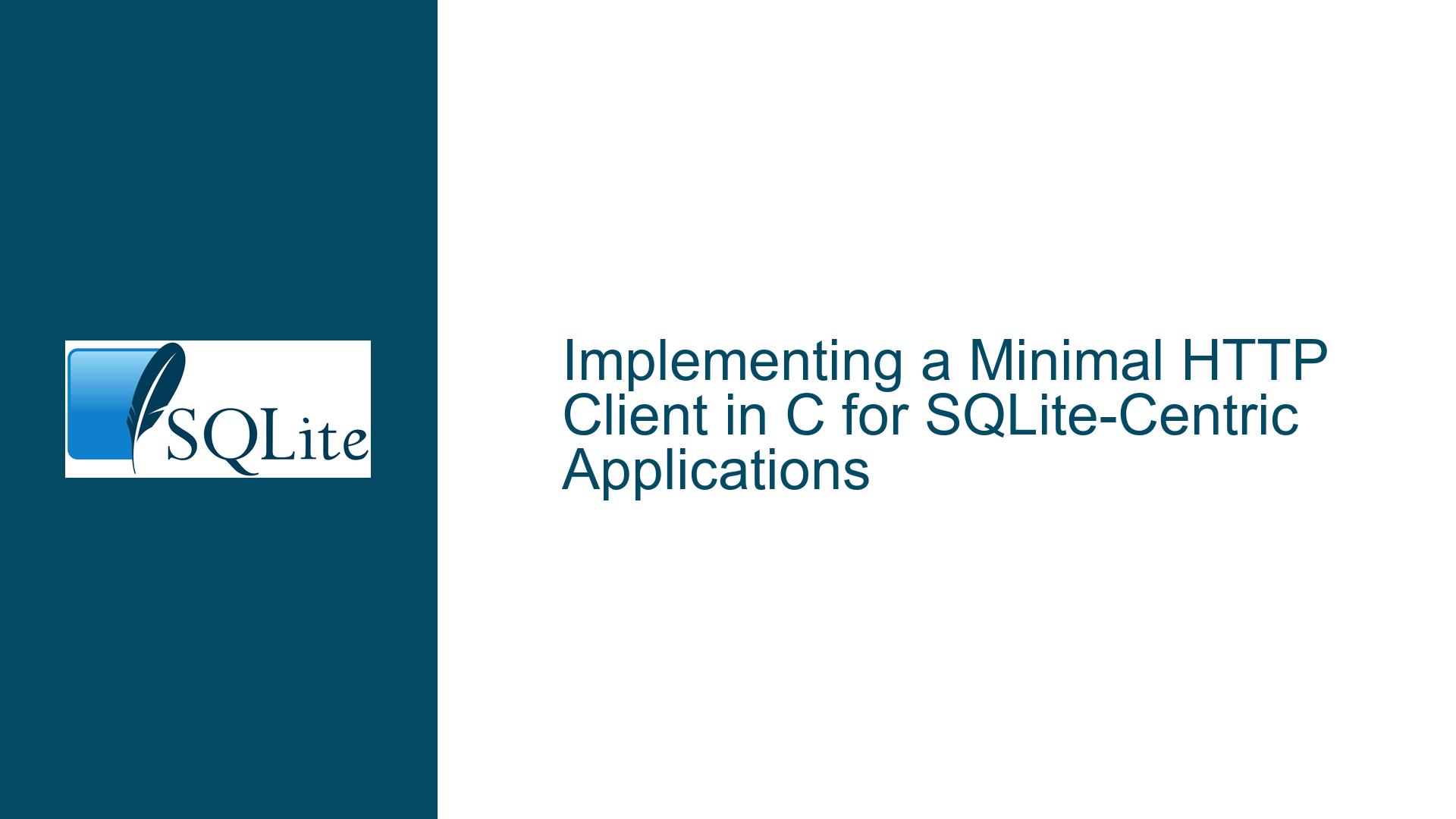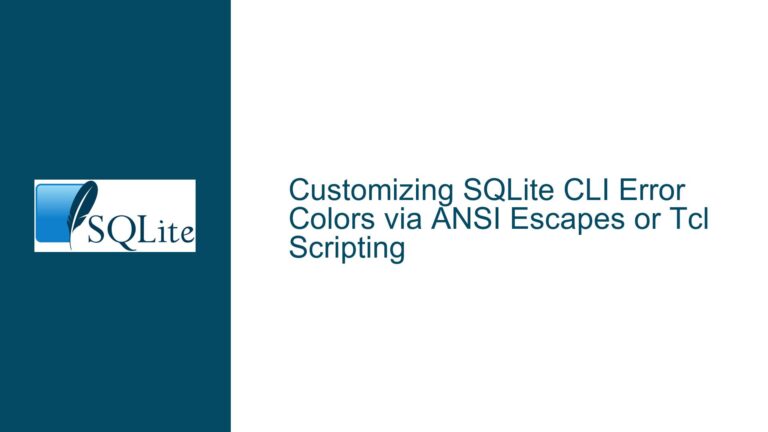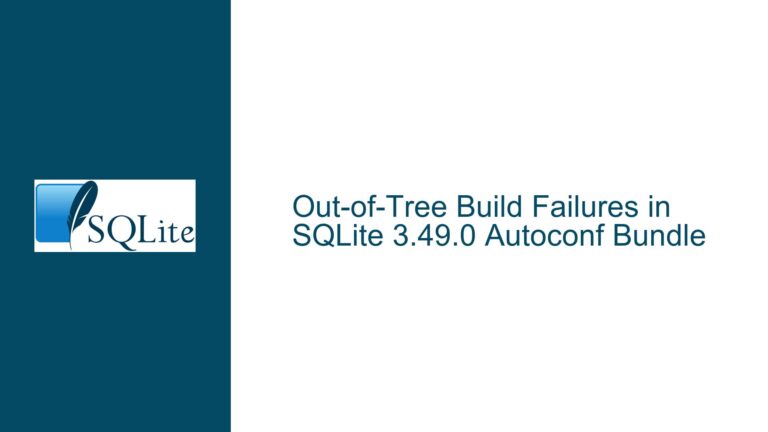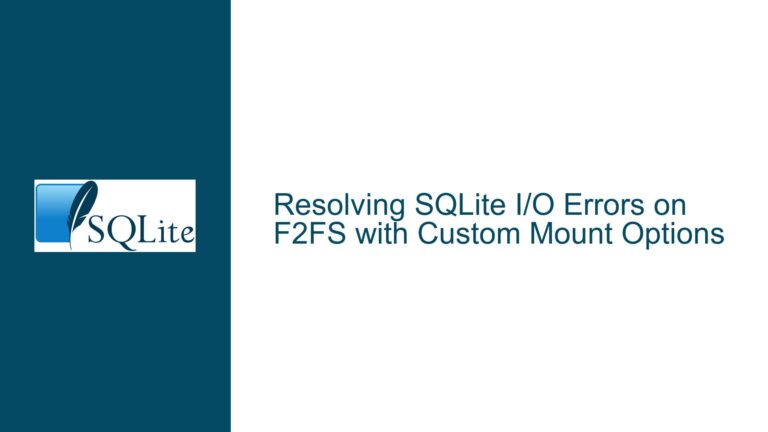Implementing a Minimal HTTP Client in C for SQLite-Centric Applications
Understanding the Need for a Dependency-Light HTTP Client in C
The challenge of implementing a lightweight HTTP client within SQLite-centric applications revolves around three fundamental constraints: strict adherence to C standard library dependencies, single-file implementation philosophy, and compatibility with SQLite’s operational paradigm. While SQLite itself exemplifies software minimalism through its self-contained design (compiling to a single amalgamation source file), extending this philosophy to network operations presents unique hurdles. The althttpd web server demonstrates that basic HTTP functionality can indeed be implemented with minimal dependencies, but its server-side orientation creates an asymmetry when attempting client-side operations.
HTTP client implementation requires different fundamental operations compared to server implementations. Where servers focus on connection acceptance, request parsing, and response generation, clients must handle DNS resolution, connection initiation, and request generation. This distinction explains why simply reusing althttpd code for client purposes proves impractical despite superficial protocol similarities. The core obstacle emerges from the need to implement several network primitives that aren’t inherently required in server implementations but are essential for client operations.
Architectural Constraints and Implementation Challenges
Three primary technical constraints dominate attempts to create a SQLite-compatible HTTP client:
- System Call Variance: POSIX networking APIs (sockets, DNS resolution) exhibit platform-specific behavior that conflicts with SQLite’s cross-platform consistency
- Protocol Complexity: Complete HTTP/1.1 implementation requires handling headers, chunked encoding, and redirects that escalate code complexity
- Dependency Management: Avoiding external libraries like OpenSSL or cURL while implementing TLS (HTTPS) adds significant implementation burden
The althttpd server sidesteps some complexity through its limited scope (no HTTPS, basic auth, or persistent connections), but client implementations face stricter requirements. For instance, clients must handle DNS lookups through getaddrinfo() – a function with platform-specific behavior in error handling and IPv6 support. Similarly, HTTP redirect handling (status codes 301/302) requires implementing logic that servers never need.
Protocol parsing presents another challenge. While servers parse incoming requests, clients must generate well-formed requests and parse varied server responses. A minimal client must at minimum handle:
- Status line parsing
- Header parsing with case-insensitive key matching
- Content-Length determination
- Chunked transfer encoding (for HTTP/1.1 servers)
- Connection management (keep-alive vs close)
Implementing these features without external dependencies requires careful state machine design and thorough testing against real web servers. The lack of standard library support for higher-level network operations forces developers to work directly with BSD sockets and manual memory management.
Practical Implementation Strategies and Workarounds
For developers committed to implementing a minimal HTTP client, five implementation strategies emerge with varying complexity:
1. Forking althttpd with Client Modifications
While althttpd is server-oriented, its network handling provides a foundation. Key modifications would include:
- Replacing accept() loop with connect() initiation
- Reimplementing request generation instead of response handling
- Adding Host header injection (critical for virtual hosting)
- Implementing basic response parsing
This approach benefits from althttpd’s existing socket management and HTTP parsing logic but requires substantial rearchitecture. The server’s main loop (which listens on a port and accepts connections) would need replacement with client logic that initiates connections and sends requests.
2. Leveraging SQLite’s Internal Utilities
SQLite’s source contains several reusable components:
- VFS Layer: Though primarily for file I/O, could theoretically abstract network operations
- Memory Management: sqlite3_malloc() family provides leak-resistant allocation
- String Handling: sqlite3_snprintf() and similar functions aid in request generation
While not directly applicable to network operations, these utilities help maintain consistency with SQLite’s error handling and memory practices. Developers could implement a custom VFS that maps HTTP resources to virtual files, though this would require significant extension beyond SQLite’s current file-oriented design.
3. Implementing a Custom HTTP/1.1 Subset
A ground-up implementation focusing on GET requests only could be achieved in ~500 lines of C code. Essential components would include:
struct http_client {
int sockfd;
char *host;
char *port;
char *recv_buf;
size_t recv_len;
};
int http_get(struct http_client *client, const char *path, char **response) {
char request[1024];
snprintf(request, sizeof(request),
"GET %s HTTP/1.1\r\n"
"Host: %s\r\n"
"Connection: close\r\n"
"\r\n",
path, client->host);
if(send(client->sockfd, request, strlen(request), 0) < 0) {
return -1;
}
// Receive logic here
return 0;
}
This snippet demonstrates basic request generation but omits critical error handling and response parsing. Complete implementation requires adding:
- DNS resolution via getaddrinfo()
- SSL/TLS support via direct socket encryption (extremely complex without libraries)
- Chunked encoding parsing
- Redirect following
4. Hybrid Approach Using Limited Dependencies
The http-client-c library (though outdated) provides a middle ground. Developers can fork and modernize its single-header implementation, addressing:
- IPv6 support via getaddrinfo() modifications
- Timeout handling with select() or poll()
- Buffer overflow protection in header parsing
- CMake/Makefile integration for cross-platform builds
Modernization efforts should focus on security fixes rather than feature additions. For example, replacing strcpy() with snprintf() in header handling and adding bounds checks in chunked encoding parsing.
5. Protocol-Level Simplifications
Restricting supported features reduces implementation complexity:
- Enforce HTTP/1.0 (avoid chunked encoding)
- Disable redirect following
- Ignore cookies and authentication
- Assume Content-Length header exists
While limiting interoperability, these constraints enable a client that handles basic GET/POST requests to well-behaved servers. Response parsing simplifies to:
- Read until double CRLF to separate headers/body
- Find "Content-Length" header
- Read exact number of bytes specified
For HTTPS support, integrating with BearSSL (a minimal TLS implementation) offers a compromise between security and dependency control. Though adding ~20KB of code, BearSSL can be compiled as a separate amalgamation, maintaining the single-file philosophy.
Implementation Roadmap for a Robust Minimal Client
Phase 1: Socket Abstraction Layer
Implement cross-platform TCP sockets with:
- IPv4/IPv6 support via getaddrinfo()
- Timeout handling
- Error code translation
enum http_error {
HTTP_ERR_NONE,
HTTP_ERR_SOCKET,
HTTP_ERR_CONNECT,
HTTP_ERR_SEND,
HTTP_ERR_RECV,
HTTP_ERR_TIMEOUT
};
struct http_socket {
int fd;
struct timeval timeout;
};
int http_connect(struct http_socket *sock, const char *host, const char *port);
int http_set_timeout(struct http_socket *sock, long milliseconds);
ssize_t http_send(struct http_socket *sock, const void *buf, size_t len);
ssize_t http_recv(struct http_socket *sock, void *buf, size_t len);
Phase 2: Request Generation
Safe generation of HTTP requests with proper header injection:
struct http_request {
char method[8];
char path[1024];
struct curl_slist *headers;
const char *body;
};
int http_build_request(const struct http_request *req, char **out) {
size_t len = 0;
// Calculate total length needed
// Allocate buffer
// Use snprintf() for each component
// Handle header injection
return 0;
}
Phase 3: Response Parsing
State machine-based parser for status line, headers, and body:
enum parse_state {
PARSE_STATUS_LINE,
PARSE_HEADERS,
PARSE_BODY
};
struct http_response {
int status_code;
char *headers;
char *body;
size_t body_len;
};
int http_parse(struct http_response *resp, const char *data, size_t len) {
// Implement state transitions
// Handle chunked encoding if necessary
// Extract Content-Length
return 0;
}
Phase 4: TLS Integration
Wrap sockets with BearSSL for HTTPS:
#include "bearssl.h"
struct https_socket {
br_ssl_client_context sc;
br_x509_minimal_context xc;
br_sslio_context ioc;
struct http_socket *tcp;
};
int https_connect(struct https_socket *sock, const char *host);
Phase 5: Error Handling and Recovery
Implement retry logic, DNS fallback, and proper resource cleanup:
void http_client_retry(struct http_client *client, int max_retries) {
for(int i=0; i<max_retries; i++) {
if(http_connect(client) == HTTP_ERR_NONE) {
break;
}
http_sleep(1000); // Wait 1 second
}
}
Security Considerations in Minimal Implementations
Implementing network protocols without robust library support introduces significant security risks that require mitigation:
- Buffer Overflows: Enforce strict bounds checking in all parsing operations
- Header Injection: Sanitize user-provided header values containing CR/LF
- TLS Validation: Implement proper certificate pinning if using BearSSL
- Denial of Service: Limit maximum header size and body length
- Information Leakage: Prevent accidental transmission of sensitive headers
A secure implementation should include:
- Header sanitization functions
- Strict maximum size limits for all buffers
- Certificate fingerprint validation
- Secure memory zeroing for sensitive data
Performance Optimization Techniques
Despite minimalism goals, performance remains critical for usability:
- Connection Pooling: Reuse sockets for multiple requests (HTTP keep-alive)
- Zero-Copy Parsing: Use pointer arithmetic instead of data copying
- Batch Processing: Pipeline multiple requests on a single connection
- Select-Based I/O: Handle multiple sockets concurrently without threads
- Header Caching: Store frequently-used headers to avoid regeneration
Example keep-alive implementation:
struct http_client {
struct http_socket sock;
bool keep_alive;
time_t last_used;
};
int http_reuse(struct http_client *client) {
if(client->keep_alive && (time(NULL) - client->last_used < 10)) {
return 0; // Reuse existing connection
}
http_disconnect(client);
return http_connect(client);
}
Cross-Platform Compatibility Strategies
Maintaining compatibility across Windows, Linux, and macOS requires abstracting:
- Socket Initialization: WSAStartup() on Windows vs. standard BSD sockets
- Non-Blocking I/O: fcntl() vs. ioctlsocket()
- DNS Resolution: getaddrinfo() behavior differences
- SSL/TLS: Certificate store locations
- Line Endings: CRLF handling in HTTP vs. platform-specific newlines
Conditional compilation handles platform specifics:
#ifdef _WIN32
#include <winsock2.h>
#include <ws2tcpip.h>
#else
#include <sys/socket.h>
#include <netdb.h>
#endif
void http_init() {
#ifdef _WIN32
WSADATA wsa;
WSAStartup(MAKEWORD(2,2), &wsa);
#endif
}
void http_cleanup() {
#ifdef _WIN32
WSACleanup();
#endif
}
Testing Methodology for Minimal Clients
Rigorous testing compensates for lack of external validation present in mature libraries:
- Unit Tests: Validate parser edge cases (malformed headers, chunked encoding)
- Integration Tests: Verify against real servers (Apache, nginx, cloud services)
- Fuzz Testing: Apply AFL/libFuzzer to discover crashes
- Protocol Compliance: Check against RFC 7230 (HTTP/1.1) requirements
- Memory Testing: Use Valgrind/AddressSanitizer to detect leaks
Example test cases:
- Server sends response without Content-Length or chunked encoding
- 301 redirect with invalid Location header
- 100 Continue status handling
- Oversized headers exceeding buffer limits
Deployment Considerations
Packaging the client as a single-header library requires careful design:
- Header-Only Design: Implement all functions as static inline
- Amalgamation Build: Combine source files into http_client.h
- Versioned Symbols: Prevent conflicts with other libraries
- Documentation: Embed usage examples in header comments
- License Compliance: Ensure compatibility with SQLite’s public domain license
Example header structure:
/* http_client.h v1.0 - Minimal HTTP client */
#ifndef HTTP_CLIENT_H
#define HTTP_CLIENT_H
#ifdef __cplusplus
extern "C" {
#endif
struct http_client;
enum http_error;
/* Function declarations */
int http_get(const char *url, char **response);
#ifdef HTTP_IMPLEMENTATION
/* Implementation code here */
#endif
#ifdef __cplusplus
}
#endif
#endif
Future-Proofing and Maintenance
Sustainable maintenance of minimal implementations requires:
- RFC Compliance Tracking: Monitor updates to HTTP specifications
- Security Advisory Monitoring: Track CVE lists for similar implementations
- Automated Build Testing: CI/CD for multiple platforms
- Versioned Releases: Semantic versioning for API stability
- Community Engagement: Encourage third-party audits and contributions
Conclusion
Implementing a SQLite-style minimal HTTP client in C demands careful balancing of protocol compliance, security, and code simplicity. While no existing solution perfectly matches the ideal of althttpd’s server-side minimalism, developers can achieve workable client implementations through strategic subsetting of HTTP features, leveraging platform abstractions, and rigorous testing. The optimal path forward combines elements from existing minimal libraries like http-client-c with modern security practices and SQLite’s engineering philosophy, resulting in a client implementation that maintains the core principles of simplicity and self-containment while providing essential HTTP capabilities.






